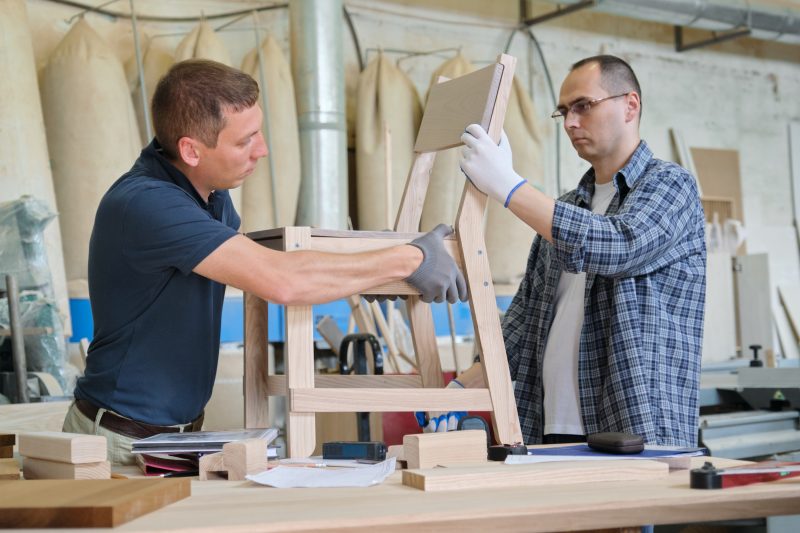Starting a furniture business can be an exciting venture, but it’s important to understand that it’s a highly competitive industry. The furniture market is constantly evolving, with new designs and materials emerging all the time. However, with the right planning and preparation, you can establish a successful business that stands out from competitors. To help you get started, here’s how to plan and launch a furniture business.
Why Start a Furniture Business?
Numerous benefits are associated with being a skilled furniture designer and launching a furniture manufacturing business. Let’s take a closer look at why this industry can be so lucrative.
Unique Products
One of the most attractive aspects of owning a furniture business is the opportunity to create unique, one-of-a-kind products. This allows you to differentiate your offerings from competitors and gives customers something special they can’t find anywhere else. Whether it’s a custom-designed dining table or an upholstered chair, you, as a furniture designer, can offer customers something truly unique.
High Margins
Furniture also typically has high margins, meaning every sale can generate a large profit. This is because furniture is often handmade and requires skill and materials that are difficult to come by, making it a relatively expensive product.
Additionally, if you can source materials and components at lower costs, you can increase your profit margins even further.
Flexibility
Finally, furniture businesses offer plenty of flexibility in running your operation. You can decide whether to keep production local or outsource it to a third-party manufacturer.
Additionally, you can sell directly to customers or partner with retailers who can bring your products to a larger audience. This flexibility can help ensure your small business that can grow and evolve as market trends change.
These are just a few reasons why starting your own furniture business can be attractive and rewarding. You can launch and run a successful business in this industry with proper planning and preparation. Be sure to consider all of these factors before making your final decision.
What are the Challenges of Starting a Furniture Business?
Starting a furniture business can be an exciting and lucrative venture, but it’s important to understand the challenges you may face. From sourcing materials and components to establishing brand recognition in the industry, there are several things to consider before diving in. Here’s a look at some challenges you’ll face when starting a furniture business.
Sourcing Materials & Components
One of the most significant challenges of running a furniture business is sourcing quality materials and components that meet your standards. Finding reliable suppliers who can provide the necessary materials, components, and raw materials at a reasonable price can be difficult.
In addition to finding suppliers who offer competitive prices, you’ll also need to assess their quality control procedures and ensure they meet your standards. You may even need to find multiple suppliers to get all the different parts you need for your furniture designs. You must clearly understand where each component is coming from to know its origin and level of quality.
Establishing Brand Recognition
Another challenge when starting a furniture business is establishing brand recognition. It can be hard to stand out amongst competitors established for longer periods. You must develop an effective marketing and promotion strategy to boost your visibility. This includes designing eye-catching logos and product packaging and leveraging social media and digital ads.
Additionally, it’s important to establish relationships with other furniture manufacturers and businesses so that they are aware of your products and services. Finally, focusing on customer service is essential for building trust in your brand and ensuring customer loyalty over time.
Ready to turn your passion for furniture into a thriving business?
Contact Growth Hackers
Developing a Lean Startup Methodology
To ensure success when starting a furniture business, it’s recommended to use a lean startup methodology rather than a traditional business plan. This involves testing your business idea before fully investing in it. Instead of spending a significant amount of time and resources developing a detailed business plan, you can create a Minimum Viable Product (MVP) that provides the core features of your furniture business.
This can be tested with potential customers to determine if there is demand for your product. Once you have validated your business idea, you can develop a more comprehensive plan that includes short-term and long-term objectives.
You should consider pricing strategies, production processes, financial projections, target customers, and local market opportunities and threats. You should also research any licensing and permits required for your business and ensure that you follow all furniture manufacturing regulations.
Starting a furniture business can be challenging, but a lean startup methodology can help reduce risks and costs while increasing your chances of success. By testing your business idea in the market first, you can refine your product and business model to meet your customers’ needs.
With dedication and a strategic approach, starting a furniture business can provide you with creative expression and financial rewards.
Steps to Starting a Furniture Business
Starting a furniture business requires careful planning, market research, and investment. Of course, it also requires a passion for the industry and creativity in creating attractive pieces of furniture to meet consumer needs. But before you start building your business name, your first piece of furniture, here are the steps you need to take to launch a successful furniture business.
Identify Your Unique Selling Proposition
Identifying your unique selling proposition (USP) is essential in starting a furniture business. Your USP is what sets your business apart from competitors and attracts customers to your products. It’s what makes your business unique and valuable to customers. To identify your USP, start by conducting a SWOT analysis (Strengths, Weaknesses, Opportunities, Threats) of your business.
This will help you understand your strengths and weaknesses and potential opportunities and threats in the market. Next, analyze your target market and determine what they value in furniture products. Do they prioritize functionality, affordability, sustainability, or style? Use this information to identify areas where you can differentiate your business from your competitors.
For instance, if your target market values sustainability, you could use environmentally friendly materials and production processes in your furniture products. Or, if they prioritize style, you could focus on unique and eye-catching designs that stand out from competitors. Once you have identified your USP, communicate it clearly and consistently in all aspects of your business.
This includes your website, marketing materials, and customer interactions. This will help you establish a strong brand identity and attract customers who appreciate your unique value proposition. Remember, your USP sets your furniture business apart from competitors and attracts customers to your products.
By identifying and communicating it effectively, you can differentiate your business, attract loyal customers, and build a successful furniture business.
Research Your Competition
Researching your competition is essential to understand the market and gaining insight into what makes them successful. Analyze their strengths, weaknesses, and pricing strategies to develop a competitive advantage that will set them apart.
Consider the size of their operation—are they a large chain store with hundreds of employees, or are they a small mom-and-pop shop? Knowing who your competitors are and how they operate will help you create an effective strategy for success. Also, look for trends in the furniture industry and any emerging technology that may give you an edge over your competitors.
Regarding the customer experience, you should focus on what sets your shop apart. Research popular pricing and customer service trends to provide a better experience than the competition. Understanding how your competitors operate and staying up-to-date with industry trends can make your furniture business stand out. Suppose you plan to offer custom furniture pieces. In that case, you should focus on developing a unique design aesthetic and sourcing high-quality materials.
Evaluate the competition’s offerings to create something that sets your custom-design furniture business apart from others in the market. You can create a strong foundation for success with a strong understanding of your competition and their strategies and knowledge of industry trends and customer preferences.
Secure Financing
Another crucial step in starting a furniture business is to secure financing. You need enough capital to purchase inventory, pay for rent or buy real estate, hire employees, advertise and market your business, and cover any miscellaneous costs associated with running a business.
It’s important to consider the different sources of finance available to you when setting up your furniture business. Bank lending is an option, and family or friends are used as investors. Another alternative is raising money through crowdfunding platforms such as Kickstarter or GoFundMe.
Whichever route you choose, ensure you have adequate funds to cover all expenses for launching your furniture business before you begin the process. Additionally, it’s important to factor in the cost of inventory when setting up a furniture business. Use your research to purchase the right amount of inventory at the best price possible, as this can help you maximize profitability. Additionally, it’s important to consider budgeting for purchasing additional furniture in the future based on customer demand and trends in the market.
A business bank account is also essential for organizing finances and tracking expenses. By planning, you can ensure your business is well-equipped to meet customer needs. Lastly, ensure you have a comprehensive understanding of the legal considerations associated with starting a furniture business to protect yourself and ensure compliance with all applicable laws.
Design and Market Your Products
The next step in launching your furniture business is to design and market your products. This means creating furniture that is fashionable, durable, and practical. Start by researching what’s popular in the current market and create designs that will appeal to customers. Additionally, consider how your products will stand up to wear and tear over time, as this can influence customer satisfaction with your product.
Once you have designed some products, begin marketing them using online platforms such as social media or a website. Use attractive photographs or videos of your furniture to show its features and benefits so potential customers can understand what they’re buying. You should also consider exhibiting at trade shows or contacting interior decorators who can help promote your furniture-making business further.
If there is a demand for your furniture, it’s important to get the word out so customers can find you. As with any business venture, building up a successful brand takes time and effort, but the rewards of providing unique and stylish pieces of furniture are worth the hard work. You can start your furniture business on the right track with careful planning and creative marketing strategies.
Take the first step today and turn your furniture dreams into a successful reality!
Source Quality Materials
When starting a furniture business, it’s essential to source quality materials to create durable furniture that will withstand wear and tear over time. Research different suppliers and compare prices to get the best deal on materials.
Also, consider whether the supplier offers discounts for bulk orders or additional services such as delivery or installation. Additionally, consider environmental sustainability when choosing materials—choose wood from sustainable forests, recycled fabrics, or other eco-friendly materials whenever possible.
Finally, inspect the material before buying it to ensure it meets your quality standards and is suitable for creating attractive pieces of furniture. Whether office furniture, home furnishings, or luxury pieces, quality materials are essential for creating beautiful products.
Here are a few tips that may help when it comes to sourcing materials:
– Visit furniture stores and ask where they source their materials;
– Look for deals on secondhand suppliers such as eBay or Craigslist;
– Ask local craftspeople for recommendations;
– Utilize trade shows, websites, and magazines to find new vendors.
You can ensure your furniture is of the highest standards by sourcing quality materials. This will give customers confidence in their purchase pieces and encourage them to return for more.
Additionally, by using sustainable materials, you can reduce your impact on the environment and demonstrate your commitment to green practices. Ultimately, this will help you build a strong reputation and loyal customer base for your furniture business. So, make sure you take the time to source quality materials before starting your own furniture store business.
Find the Right Location
In addition to sourcing quality materials, finding the right location for your furniture business is essential. A good location can help draw customers in and make a great first impression.
Consider factors such as foot traffic, visibility, parking availability, access to public transportation, and whether or not there are any other furniture stores nearby. If possible, visit potential locations during different times of the day so you can get an accurate sense of the area’s foot traffic.
Additionally, research local zoning laws or other regulations that may affect where you can open a business. Once you have identified the best spot for your furniture store, think about how you will decorate it to create an inviting atmosphere for customers.
Opening a shop in the right location is key to running a successful furniture business. It will help you draw in customers, create a positive impression, and ensure that your store complies with local laws and regulations. So, selecting a spot for your business is an important step that could make or break your success as a business owner and furniture entrepreneur.
Improve Your Business
Once your furniture business is up and running, it’s important to continue improving it to stay competitive. This could mean investing in better equipment or materials, adding new products to your lineup, or creating a customer loyalty program.
Consider researching furniture industry trends and adapting accordingly to keep up with changing tastes and preferences.
Invest in digital marketing efforts such as an email list or social media campaigns to reach more potential customers. Finally, consider launching a blog or website where you can share tips on the best use and care for furniture pieces or showcase photos of finished projects.
Doing this will help build customer loyalty and help you stand out. A business online presence can also help enhance your sales by making it easier for customers to reach you.
Overall, staying on top of industry trends and investing in marketing efforts can help you keep your furniture store business more competitive. In addition, working to create a high-quality product that customers love and building strong relationships with them can help ensure success for your furniture business. So take the necessary steps to improve your furniture business and watch it grow!
Closing Thoughts About Starting a Furniture Business
Starting a furniture business can be exciting and rewarding, but there’s more to it than just sourcing great furniture and getting it in front of potential customers. You must ensure you accurately price your products, manage your inventory efficiently, and find the right business partners. Additionally, you should find a way to stand out within the industry, as there is no shortage of competition.
Ensuring you have all the necessary legal documents in order is also key. This includes getting a business license and filing for any permits or licenses your state may require. Having the proper business insurance to protect your business from potential liabilities is another must-have.
Finally, it’s important to have realistic expectations about your business structure and the time, effort, and money it will take to get your furniture business up and running. Even with a great product offering, it can take months or even years to build the success of your business.
If you keep all these considerations in mind, you’ll be well on your way to starting a successful furniture business! Good luck!
Growth Hackers is an award-winning manufacturing marketing agency helping businesses from all over the world grow. There is no fluff with Growth Hackers. We help entrepreneurs and business owners start a furniture business, increase their productivity, generate qualified leads, optimize their conversion rate, gather and analyze data analytics, acquire and retain users and increase sales. We go further than brand awareness and exposure. We make sure that the strategies we implement move the needle so your business grow, strive and succeed. If you too want your business to reach new heights, contact Growth Hackers today so we can discuss about your brand and create a custom growth plan for you. You’re just one click away to skyrocket your business.









